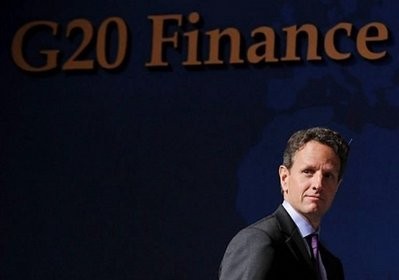US Treasury Secretary Timothy Geithner held talks with his Chinese counterpart Sunday on economic ties amid tensions over China's currency, which Washington believes is undervalued.
Geithner met Vice Premier Wang Qishan in the eastern coastal city of Qingdao a day after a Group of 20 finance ministers meeting wrapped up in South Korea.
Washington has long argued that China's currency, the yuan, is being kept grossly undervalued in order to help Chinese exporters.
Beijing counters that loose US monetary policy is driving down the dollar and causing a wave of capital to flood emerging markets in search of higher yields.

The G20 talks ended on Saturday with an agreement to avoid tit-for-tat currency devaluations and aim for "more market-determined exchange rate systems".
Following the Geithner-Wang talks, the US Embassy released a statement saying they "exchanged views on US-China economic relations", without giving further details.
But in an interview conducted ahead of the meeting, Geithner said he believed China would let the yuan appreciate.
"They recognise it's important to the world. China recognises that and I think we're going to see them continue to move," he told Bloomberg Television, in comments published Sunday.
The US Treasury chief said that China had some way to go in loosening its grip on the yuan, Bloomberg reported.
"But I think they're committed to do that, because they recognise it's in their interest," the channel quoted him as saying.
Beijing has bristled at criticism from Washington about the value of the yuan, which some lawmakers have charged is undervalued by as much as 40 percent, giving Chinese exporters an unfair trade advantage.
US President Barack Obama is likely to meet Chinese President Hu Jintao on the sidelines of the G20 summit in Seoul from November 11-12. Obama is scheduled to attend the meeting, but Hu's attendance has not been officially announced.
In a statement released on Saturday, Geithner said the G20 meeting agreed that a "gradual appreciation" in the currencies of major trade-surplus nations was required.
"Countries with significantly undervalued exchange rates committed to move towards more market-determined exchange-rate systems that reflect economic fundamentals, as China is now doing," Geithner said in the statement.
But further efforts to stabilise international economic imbalances were necessary if the recovery from the global financial crisis was going to be successful, he added.
"This requires a shift in growth strategies by countries that have traditionally run large trade and current account surpluses, away from export dependence and toward stronger domestic demand-led growth," Geithner said.
"This entails a range of policy changes, as you can see in the very broad range of domestic reforms being undertaken by China."
Geithner was scheduled to return to the United States Sunday following his talks with Wang, US officials said.
Last week, China announced that Hu would visit the United States in January next year, as the world's top two economies seek a way to sort through a host of disputes.
The US trade deficit with China ballooned to a new record in August, sharply widening the overall trade gap, according to official US data released this month.
The two sides are also at odds over a series of trade disputes and human rights issues, such as the case of jailed dissident Liu Xiaobo, who was awarded the 2010 Nobel Peace Prize, sparking Beijing's anger and Washington's praise.







)
















